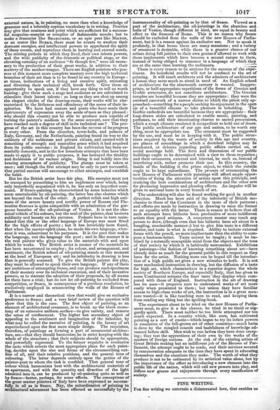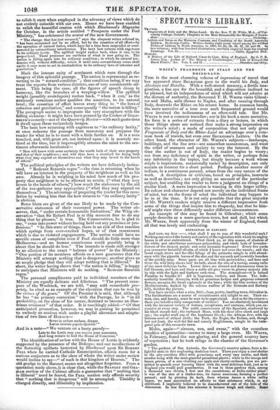FINE WRITING.
FOR fine writing we entertain a disinterested love, that enables us
to relish it even when employed in the advocacy of views which do not entirely coincide with our own. Hence we have been enabled to relish the beautiful oration with which Blackwood's Magazine for October, in the article entitled "Prospects under the Peel Ministry," has celebrated the avatar of the new Government.
"The change that has just occurred," says the eloquent writer referred to, "bas been occasioned not by an effort, but by the cessation of ill effort—by the operation of natural forces, which have for a time been suspended or over- powered by extraordinary interference. The bent bow returns with eagerness to its ordinary laxity. The uplifted weight rushes back, when it can, to its properleveL These processes are emblems of what is now going on. The nation is falling again into its ordinary condition ; hi which its natural ten- dencies will, without difficulty, retain it until some extraordinary cause shall excite it once more to act in contradiction to its ordinary laws of cohesion and gravitation." Mark the intense unity of sentiment which runs through the imagery of this splendid passage. The nation is represented as re- verting to its "natural condition" ; that condition being, if we may trust the reports from various districts, one of very considerable ail- ment. This being the case, all the figures of speech droop in harmony, like the branches of a weeping-willow. The uplifted weight (possibly avoirdupois) rushes back, "when it can," as the anxiously veracious author qualifies the assertion, to its natural level ; the cessation of effort leaves every thing to " the laws of cohesion and gravitation," and consequently "the nation is falling." The paragraph seems to impregnate the very atmosphere with the falling sickness : it might have been penned by the Croker of GoLD- extra s comedy—not of the Quarterly Review—with such gusto does it dwell upon these melancholy images.
The bent bow returning with eagerness to "its ordinary laxity," at once redeems the passage from monotony and prepares the reader for what be is to meet with a little further on. It is a note touched, and, with great art, not insisted upon : it is scarcely no- ticed at the time, but it imperceptibly attunes the mind to the sen- timent afterwards inculcated-
" Men will know with some certainty the worth both of their own property .and that of their neighbours ; and will thus have a standard for fixing both what they may expend on themselves and what they may invest in the hands of others."
The political principles of the writers are here delicately insinu- ated. " Redeunt Saturnia regna "—the time is returning when he will have an interest in the property of his neighbour as well as his own. Already he is weighing in his mind how much of his pro- perty that neighbour is to be allowed to retain, (" what they may -invest in the hands of others,") bow much the statesmen by the aid of the tax-gatherer may appropriate (" what they may expend on themselves.") The advantage of preparing the reader for this reve- lation by warning him that the bow returns to "its ordinary laxity" is obvious.
Some hints are given of the use likely to be made by the Con- -servative statesmen of their recovered power. The writer ob- -serves, that, "under certain honourable limitations," the Whig ob- servation "that Sir Robert Peel is at thig moment free to do any thing that he pleases," is true. The Conservatives, he is glad to -say, "came into power without having held out any promises or pro- fessions." "In this state of' things, there is no risk of that reaction which springs from over-excited hopes, or of that resentment which is due to violated engagements. The nation would have no specific cause of complaint even if Peel should do little more than Melbourne—and no human contrivance could possibly bring it about that he should do less." The inuendo is made still stronger by an allusion to the exact "balance of power" in the Ministry : 44 One portion of its members affords us a sure guarantee that the Ministry will attempt nothing that is dangerous ; another gives us all ample pledge that they will adopt nothing that is illiberal." In short, the writer having shown that "the nation is falling," is happy to anticipate that Ministers will do nothing. " Redeunt Saturnia regna."
The personal compliments paid to individual members of the Ministry are equally delicate and felicitous. "The present occu- pant of the Woolsack, we are told, "may with remarkable pro- priety, be cited as an example of the elevation that can be won by -the virtues of the gown." Of the Premier it is said, that although be has "no primary connexion" with the Peerage, he is "in all probability, on the close of his career, destined to become an illus- trious ornament" of that order. It is touchingly added—" Of that anticipated promotion, however, we may in passing be permitted to embody an anxious wish under a playful alteration and adapta- tion of two lines of HORACE-
' Serns in caelum ambeas, diuque
Lanus intersis populo Quirini.' "
And in a note—" We venture on a hasty parody— Late to the Lords may you receive your summons, And long remain to lead the House of Commons."
The identification of cesium with the House of Lords is evidently -suggested by the presence of the Bishops - and our recollections of the flattering epithets bestowed by Blackwood upon Sir ROBERT PEEL when he carried Catholic Emancipation, affords room for a -curious conjecture as to the class of whom the writer under review would incline to say—" of such is that kingdom of Heaven." The old grudge to the Baronet seems not altogether forgotten. From a ,quotation made above, it is clear that, while the STANLEY and GILA- IHAM section of the Cabinet affords a guarantee that "nothing that is illiberal" need be feared, the PEEL section only affords security that " nothing that is dangerous" will be attempted. Timidity is 'charged directly, and illiberality by implication.



























 Previous page
Previous page